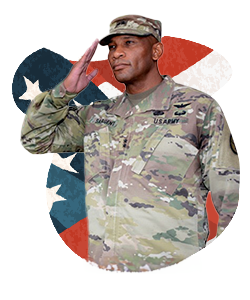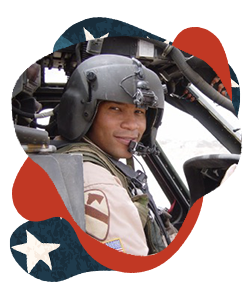 Patrick Sargent’s path to leadership started long before the military. Although he didn’t realize it at the time, the example set by his family back home ignited a worldview that would take him all the way to the top of military and corporate leadership. “My grandmother and mother are my mentors and instilled in me the ethos of being a servant leader that’s laser focused on being of service to others and living by the Golden Rule (treating others as you would want to be treated by them),” he shares.
Patrick Sargent’s path to leadership started long before the military. Although he didn’t realize it at the time, the example set by his family back home ignited a worldview that would take him all the way to the top of military and corporate leadership. “My grandmother and mother are my mentors and instilled in me the ethos of being a servant leader that’s laser focused on being of service to others and living by the Golden Rule (treating others as you would want to be treated by them),” he shares.
Pat often draws on the words of Jackie Robinson to keep him centered on this: ‘A life is not important except in the impact it has on other lives.’ Servant leaders focus on the needs of others to foster the growth and wellbeing that enables effective teams to flourish. It’s a style that sees the bigger picture and never loses sight of the fact that people matter most.
“During my childhood I felt service first-hand living near Tyndall Air Force Base and through my grandmother,” Pat explains. “Though small in stature and poor in material wealth, she was the epitome of a servant leader—primarily focused on improving the humanity of her community. My mother, a single parent, who worked as a maid to care for me and my siblings—was a servant leader—she subordinated her personal needs to improve her children’s futures. They epitomized and instilled in me the meaning of selfless service in the context of Martin Luther King Jr’s words: ‘Everyone can be great, because everyone can serve’”.
Make every opportunity count
He credits his success to mentors like this who “taught me that leadership is about caring for and taking care of people.” He notes that only in America is his story even possible. His mentors provided more than conversation—they advocated for him at critical points in his career. Pat is a fan of the French moralist La Rochefoucauld and sees his professional success through his maxim: ‘It’s amazing how soon we acquire talents for positions of trust and importance, The higher the situation, the higher the opinion we have of ourselves. And as is your confidence, so too shall be your capacity. We assume an equality with circumstance.’ This has had a major influence on Pat’s outlook. “Life is a series of moments,” he shares, “so make every opportunity count by performing at your absolute best despite the role you are assigned.” Throughout his myriad leadership positions, one lesson has remained constant—”if you don’t know what makes a person laugh or cry you will have a hard time leading them.” As much as a leader can know the way and show the way, they must also lead with empathy if they’re to earn the loyalty of their people. Pat sees humility and empathy here as the “new 21st century smart”. To Pat, “service is one of those words like liberty, freedom, and justice, that to be understood, like the blues, needs to be felt, not just heard.”
Transformational leadership: Agility and growth
His leadership approach has grown over time to something more transformational. Now, he sees his duty as one of creating change for the better—in people and organizations. “Being a transformational leader has allowed me to succeed at one of the greatest challenges facing a leader in business—how to remain competitive and thrive amid constant change and disruption,” he explains. As a Veteran at Oracle, Pat is well-informed on the importance of effective leadership, and how even at the highest levels, a leader should still selflessly serve. This fuels his drive to connect with his people every day. “Something I have learned from the military is every senior executive, whether a CEO or general officer, benefits from a second set of eyes, ears, arms, legs and another brain for new and different perspectives and ideas to remain agile and growth focused. Most importantly, I found this leadership style enhances your ability to achieve buy-in and commitment from members of the organization.”
Improving humanity at home and abroad
Pat has served as the Deputy Commanding General for Operation of the US Army Medical Command, 18th Chief of the US Army’s Medical Service Corps, Commanding General, US Army Medical Center of Excellence, Commanding General USA, Regional Health Command—Pacific, Commander, Carl R. Darnall Army Medical Center, and most notably, as the Medical Task Force Commander of US Combat Healthcare System in Iraq for 15 months supporting US and Coalition partners. This staggering list of accomplishments is far from complete and only hints at the full breadth of his 35-year career. Before Oracle, he served as the Chief of Staff for OptumServe, and as a senior vice president led business development and emergency preparedness. This has only sharpened his knowledge of private sector healthcare.
“I gained a tremendous appreciation for the rhythm of business and the culture of corporate America,” he explains, but his true calling was yet to come. His next move to Cerner would ultimately lead him to help shape Oracle’s government health services strategy during a period of incredible innovation and growth. “As I transitioned to Cerner and subsequently Oracle, I felt both a sense of honor and more than a small amount of excitement. Oracle’s acquisition of Cerner solidified my belief that we are at a strategic inflection point and on the precipice of not only changing electronic health recording (EHR), but fundamentally transforming the way healthcare is provided and influences lives.” It’s a move that puts him at the very epicenter of transforming healthcare IT. A fitting place for a transformational leader.
lead him to help shape Oracle’s government health services strategy during a period of incredible innovation and growth. “As I transitioned to Cerner and subsequently Oracle, I felt both a sense of honor and more than a small amount of excitement. Oracle’s acquisition of Cerner solidified my belief that we are at a strategic inflection point and on the precipice of not only changing electronic health recording (EHR), but fundamentally transforming the way healthcare is provided and influences lives.” It’s a move that puts him at the very epicenter of transforming healthcare IT. A fitting place for a transformational leader.
Preserving America’s national treasure
Moving to Cerner at such a critical time and discovering the alignment between his personal mission and Oracle’s almost seemed like fate. Time and again, Pat has seen his military experience underpin his corporate leadership journey.
“As a MEDEVAC/DUSTOFF pilot—Dedicated Unhesitating Support to our Fighting Forces—I understand the importance of balancing an extraordinarily complex, tightly coupled, unstable system with a lot of energy in it. In aviation it is universally understood that it’s optional to take off, but mandatory to land!” “At first, it may not seem intuitive, but I see similarities between my experience on and above the battlefield and the bedside in today’s healthcare ecosystem—where zero preventable harm is the overarching end state.”
Pat described his tenure commanding the Combat Healthcare System in Iraq as transformative. His mission was straightforward: “Provide strength for the warrior, hope for the wounded, and comfort for the dying”. Ultimately, to preserve America’s national treasure—the lives of its sons and daughters. Over the course of 15 months he and his soldiers experienced the best and worst of humanity. He is most proud of his duty in Iraq where his unit achieved a 98% survival rate for casualties entering their medical facilities.
Nothing but the best
This holistic outlook enabled him to bring his full experience to bear at Oracle Healthcare Government Services (OHGS) from day one. He’s also driven to do his part in delivering next generation healthcare to those who still serve. “Our service members, family members, and Veterans—just like patients—deserve nothing but the best,” Pat explains. “Not yesterday’s concept of best, nor today’s, they deserve tomorrow’s best.”
“The military trained me exceedingly well for the pace of change I have experienced since joining Oracle. Over the course of my career, I have deployed to combat three times as a company, battalion, and brigade commander and let me tell you it is the epitome of Volatility, Uncertainty, Complexity, and Ambiguity (VUCA). My experiences provided the necessary wisdom to function in a VUCA business environment.”
Duty, honor, country
This goes a long way to explaining his comfort among the once-in-a-lifetime challenges of tech and healthcare he’s witnessing. He also sees Oracle and the military as similarly values-based in their dedication to supporting potential. “In my opinion it’s essential to have a culture that nurtures psychological safety, accountability, teamwork, and communication; and the learning system must include transparency, reliability, negotiation, improvement and measurement, and continuous learning.”
He’s quick to point out how our Military Affiliated Veteran Employee Network (MAVEN) and initiatives like the Oracle Veteran Internship Program play crucial roles in bridging cultures. “I have had the privilege of serving alongside our MAVEN colleagues in peace and during armed conflict. Oracle is affording hundreds of us the opportunity to serve in a new way, deploying and improving the very systems designed to support our healthcare journeys from military service to Veteran status.”
“It is a privilege to get to know Veterans—young and old—in our daily work and to honor their devotion to supporting the Constitution and defending our nation’s freedom.”
In good company
Pat’s remarkable career is a testament to the enduring values of service, sacrifice, and transformation.
As he navigated a distinguished military career, transitioning to corporate roles, he continues to be a driving force in transforming healthcare for the better. And he’s in good company among likeminded leaders at Oracle.
Do you want to transform the world for the better alongside leaders who truly value people? Explore Oracle Health careers now or check out all open positions across Oracle.
